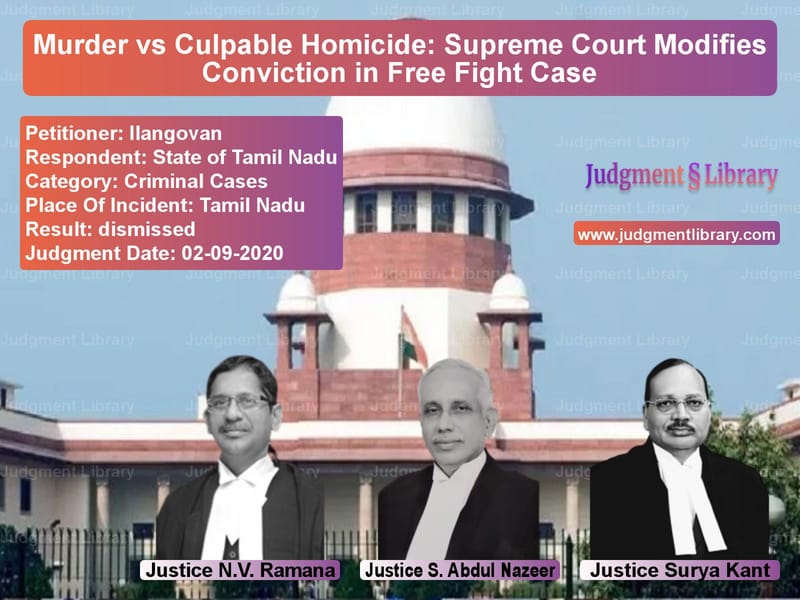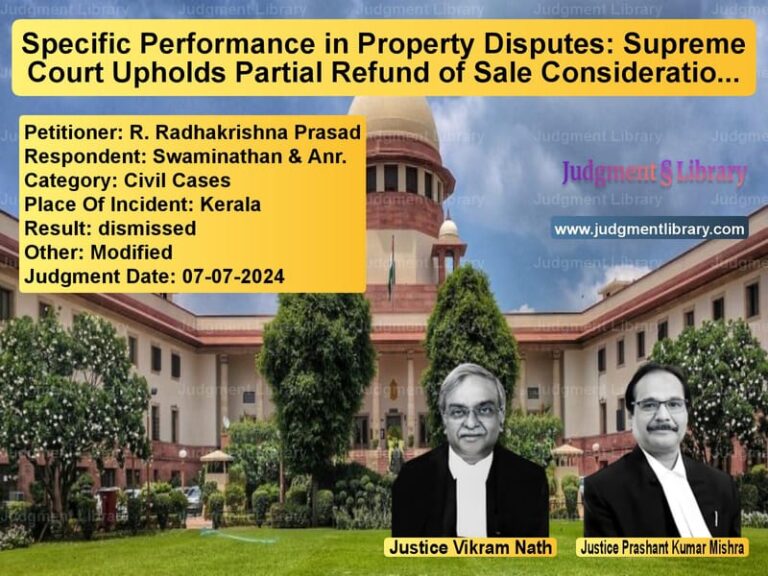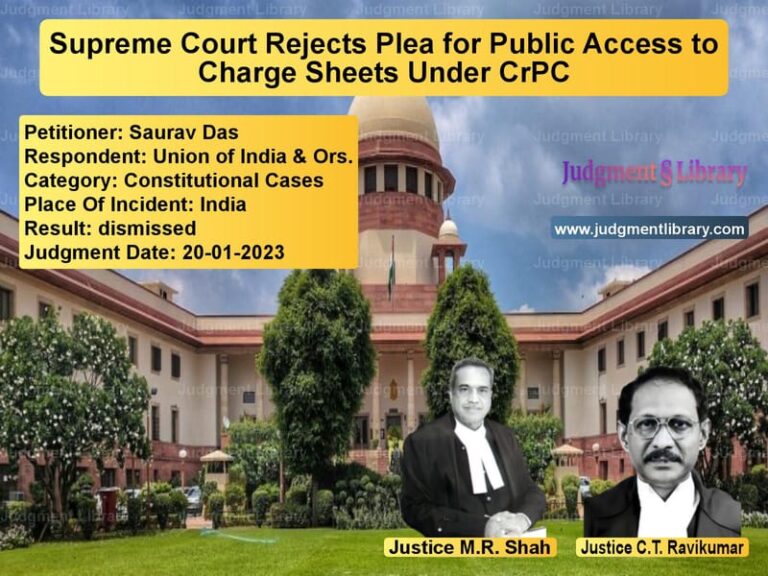Murder vs Culpable Homicide: Supreme Court Modifies Conviction in Free Fight Case
The Supreme Court of India, in the case of Ilangovan vs. State of Tamil Nadu, addressed an important legal issue regarding the distinction between murder under Section 302 IPC and culpable homicide not amounting to murder under Section 304 IPC. The case revolved around an incident of a sudden fight between two families, leading to a fatal injury inflicted by the appellant.
The Court’s judgment provides clarity on the application of Exception 4 to Section 300 IPC and reaffirms legal principles regarding free fights, provocation, and the reliability of related witness testimonies.
Background of the Case
The appellant, Ilangovan, was convicted under Section 302 IPC by the Trial Court for the murder of the deceased. He was sentenced to life imprisonment. The Madurai Bench of the Madras High Court, upon appeal, modified his conviction from Section 302 IPC to Section 304 Part II IPC and reduced his sentence to five years of rigorous imprisonment along with a fine. The conviction under Section 324 IPC was upheld.
The dispute arose due to an alleged illicit relationship between the complainant’s brother and the daughter of a co-accused. This led to enmity between the families and culminated in a violent altercation on January 26, 2002, where the appellant attacked the complainant with an iron rod, and the deceased suffered a fatal blow while intervening in the fight.
Legal Issues and Arguments
The main legal issues in this case were:
- Whether the act of the appellant constituted murder or culpable homicide not amounting to murder.
- Whether the evidence of related witnesses was reliable and could be the basis of conviction.
- Whether the benefit of doubt extended to co-accused should also apply to the appellant.
Petitioner’s Arguments (Ilangovan)
The appellant’s counsel raised the following arguments:
- The High Court erred in relying solely on the testimonies of the deceased’s relatives.
- The benefit of doubt granted to the co-accused should also have been extended to the appellant.
- The incident was a result of a sudden fight, making it fall under Exception 4 to Section 300 IPC.
- The appellant had no premeditated intent to kill; the attack was in the heat of the moment.
Respondent’s Arguments (State of Tamil Nadu)
The prosecution countered by arguing:
- The appellant specifically targeted the deceased and inflicted a fatal head injury.
- Even if the incident occurred during a free fight, the nature of the attack showed knowledge of likely fatal consequences.
- The testimony of eyewitnesses was consistent and corroborated by medical reports.
- The High Court had already given leniency by modifying the conviction to Section 304 Part II IPC.
Supreme Court’s Ruling
The Supreme Court upheld the High Court’s judgment, ruling that:
- The testimonies of related witnesses cannot be disregarded solely because they are relatives; they must be scrutinized with caution.
- The acquittal of co-accused does not automatically entitle the appellant to acquittal.
- The fight was sudden and without premeditation, bringing the case under Exception 4 to Section 300 IPC.
- The appellant’s act amounted to culpable homicide, not murder, and the reduced sentence of five years was justified.
Legal Principles Established
This ruling clarifies several key legal principles:
- Application of Exception 4 to Section 300 IPC: A sudden fight without premeditation can reduce murder to culpable homicide.
- Reliability of Related Witnesses: Testimonies of related witnesses can be accepted if found consistent and credible.
- Acquittal of Co-accused: The acquittal of some accused does not automatically lead to the acquittal of others if independent evidence supports their guilt.
- Judicial Discretion in Sentencing: Courts can modify sentences based on the circumstances of the crime.
Conclusion
The Supreme Court’s decision in Ilangovan vs. State of Tamil Nadu underscores the importance of assessing each case based on facts and circumstances. By modifying the conviction and sentence, the Court ensured a balanced approach between legal principles and justice. This ruling will serve as an important precedent in cases involving sudden altercations leading to fatal injuries.
Petitioner Name: Ilangovan.Respondent Name: State of Tamil Nadu.Judgment By: Justice N.V. Ramana, Justice S. Abdul Nazeer, Justice Surya Kant.Place Of Incident: Tamil Nadu.Judgment Date: 02-09-2020.
Don’t miss out on the full details! Download the complete judgment in PDF format below and gain valuable insights instantly!
Download Judgment: Ilangovan vs State of Tamil Nadu Supreme Court of India Judgment Dated 02-09-2020.pdf
Direct Downlaod Judgment: Direct downlaod this Judgment
See all petitions in Murder Cases
See all petitions in Attempt to Murder Cases
See all petitions in Bail and Anticipatory Bail
See all petitions in Custodial Deaths and Police Misconduct
See all petitions in Extortion and Blackmail
See all petitions in Judgment by N.V. Ramana
See all petitions in Judgment by S. Abdul Nazeer
See all petitions in Judgment by Surya Kant
See all petitions in dismissed
See all petitions in supreme court of India judgments September 2020
See all petitions in 2020 judgments
See all posts in Criminal Cases Category
See all allowed petitions in Criminal Cases Category
See all Dismissed petitions in Criminal Cases Category
See all partially allowed petitions in Criminal Cases Category







